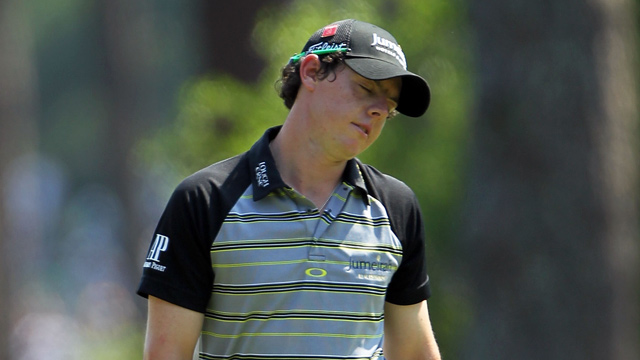NEWS
A Lesson Learned: Fighting off nerves and tension

In the 75 years that there has been a Masters, you’d be hard-pressed to find one that had more drama and excitement among such a large group of players as this past one. Charl Schwartzel’s four straight birdies to finish was astounding, but don’t forget the chip in for birdie on the first hole or the hole-out for eagle on the third. The young man played some incredible golf and is a deserving champion.
As I watched in amazement at all the different storylines, I realized I had a large number of possibilities to write about for this week’s “A Lesson Learned.” Tiger Woods’ aggressive play made up a seven stroke deficit in eight holes. His inability to convert a few short putts on the back nine cost him a chance to win a fifth green jacket. The Australian contingent of Ogilvy, Day and Scott showed incredible poise and looked like one of them would take the green jacket down under for awhile. There was also a time when I was sure K.J. Choi would win with his almost robotic-like consistency. And of course, Charl Schwartzel’s four-birdie close will be written about ad nauseum for years to come. But in some ways, the story of the week may have been the three-day dominance of Rory McIlroy and the gut-wrenching back nine he endured on Sunday. And those putts. Everyone remembers his drive on No. 10, but those putts on Nos. 11 and 12 are what doomed his chances.
I noticed early that Rory seemed to be walking a little quicker than normal. That’s a sign of tension. It showed early with a bogey at the first. But he did a good job, albeit with a few early struggles, of righting the ship and stood on the 10th tee still one shot ahead of the rest of the field. And then, one pulled drive later, a shot from by the cabins to the left of the tenth hole and a pitch that hit a tree near the green that came back to him, the young man had a triple bogey and was two shots behind.
But then he missed a short birdie putt on eleven and an even shorter par putt on the same hole. He then missed more short putts as he four-putted for double bogey on the 12th. Hearts across the golf world were breaking for him. It was maddening. It was gut wrenching. And to many golf instructors, it was understandable. We’ve all seen it before. We’ll see it again.
I heard the commentators talking about how all day, he seemed to be pulling his putts. That is what happens when you get tense.
When better players feel tense, they know it and often try, subconsciously, to make adjustments. When you feel like you’re too quick, you will slow your hands down, almost decelerate them, to get back what you think is your proper, natural rhythm. And you’re tense because you remember missing a short one earlier. That’s when even the shortest putts seem like hieroglyphics.
When you feel your body and nerves getting tense, you need to give yourself a deep breath and get back to the basics. This means regulate your breathing, exhale and be sure you go through your pre-shot routine. Most importantly, accept that anything that has happened on the last hole or last shot is not indicative of what will happen to you on your next shot. The best players in the world hit poor shots, miss short putts, stub easy chips. You will too. It happens. When your body tenses up, it may increase the likelihood of it. You’ve got to get back to basics. But if and when a bad shot or bad break happens, you have to accept it and move forward. Don’t let one bad hole turn into two or three. Don’t let one bad swing mess up your rhythm for the next five swings.
As for young Rory McIlroy, his fundamentals and balance are so solid, I am confident he will be back in contention at major championships soon. Probably very soon. He needs to use this experience to learn how to handle his emotions and learn to rely on his routines and selective memories when he gets back into that same position.
And for all of you who will be playing in a club championship, your weekend Nassau or just trying to beat your personal best: whenever you feel the pressure starting to build, remember that it effects every player of every level. Take a breath, go through your routine and perform confidently, regardless of what happened in the past. Your best golf shot should always be the next one!
Bobby Hix is the PGA Director of Golf at the Arnold Blum Golf Learning Center at the Idle Hour Club in Macon, Georgia. A PGA Member for 23 years, Bobby is the 2010 Georgia Section PGA Teacher of the Year. Other PGA awards include Section Junior Golf Leader and Assistant Professional of the Year, Central Chapter Teacher of the Year (3 times), Junior Golf Leader and Professional of the Year. A Member of the PGA President’s Council on Growing the Game, Bobby is also on the Board of Directors of the Georgia Junior Golf Foundation. Bobby’s most recognized student is University of Georgia senior Russell Henley, a 3 time All American who tied for the lowest finish as an amateur in the 2010 US Open at Pebble Beach.
